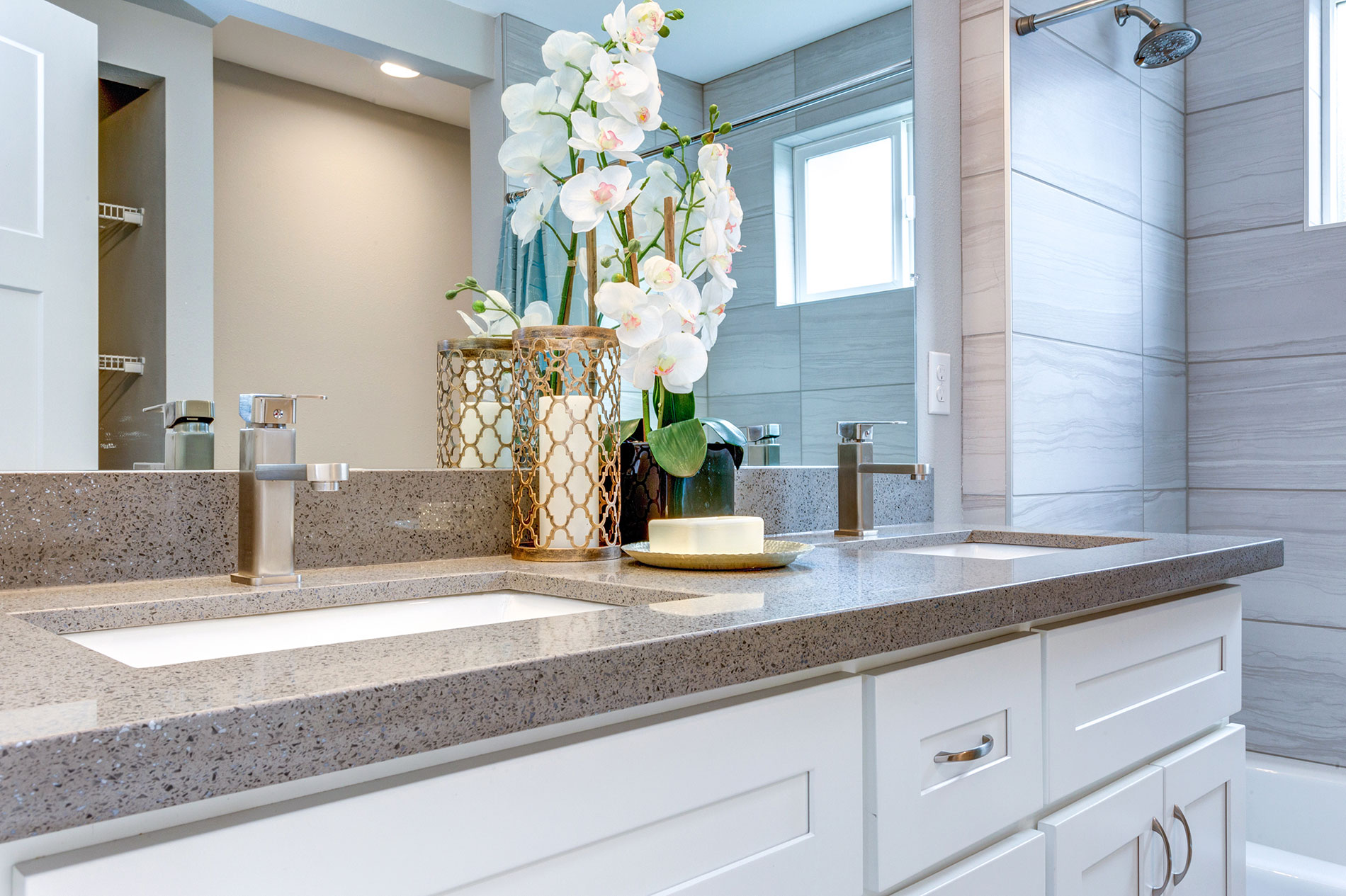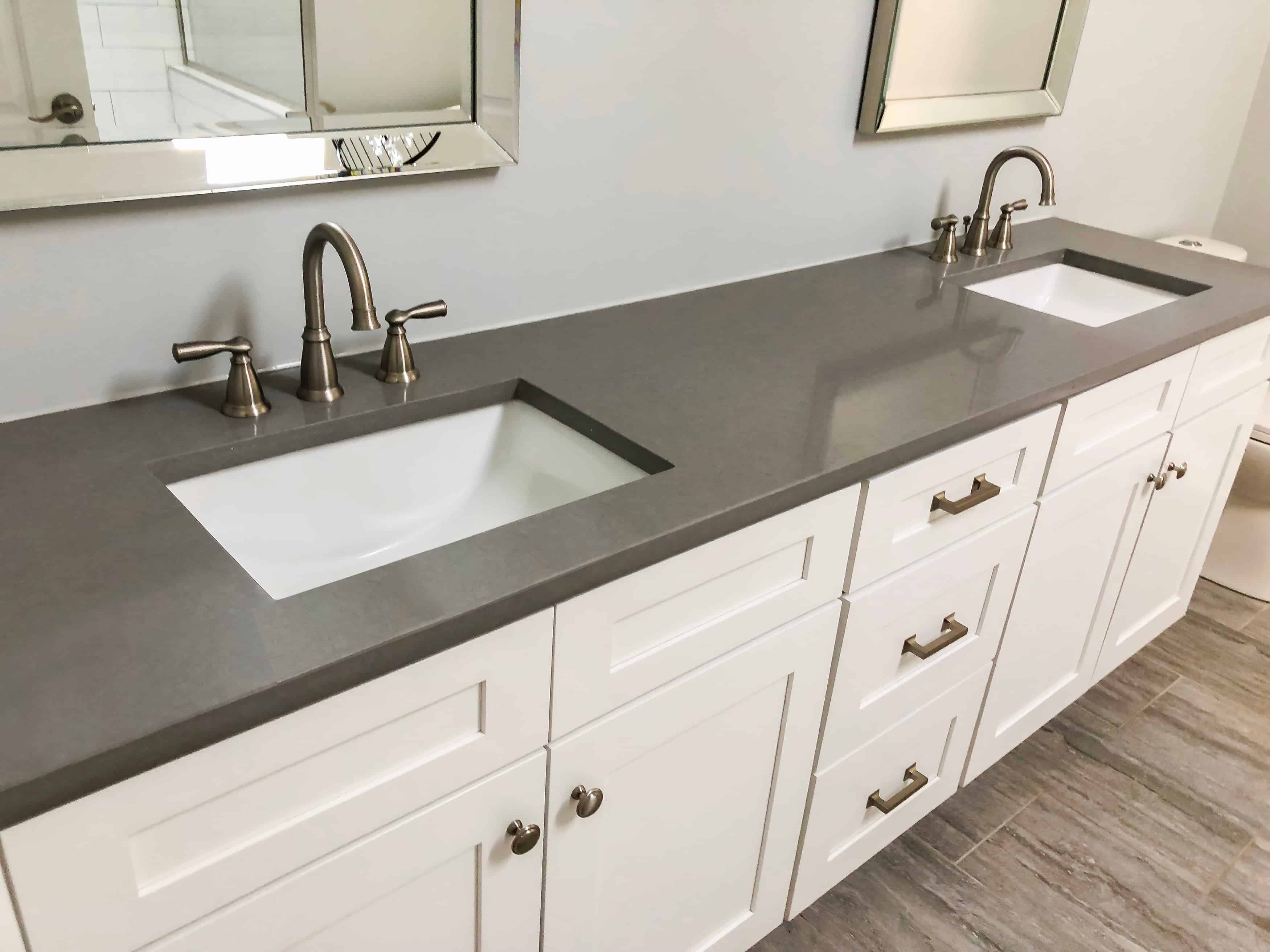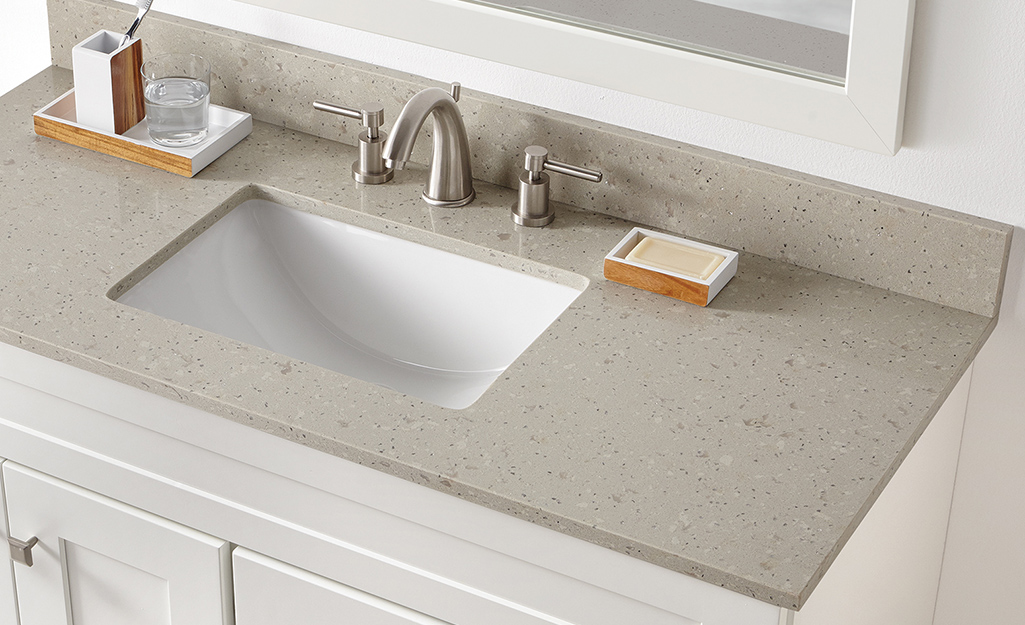Factors to Consider When Choosing Bathroom Countertops: What Type Of Countertop Is Best For Bathroom

Choosing the right countertop for your bathroom is an important decision that impacts both the functionality and aesthetics of your space. It’s a choice that needs careful consideration, taking into account various factors that can influence the overall look and feel of your bathroom.
Durability
The bathroom environment poses unique challenges for countertops, with constant exposure to moisture, potential for spills, and the risk of scratches. Durability is paramount in this setting. Countertops must be able to withstand the rigors of daily use without succumbing to damage.
- Moisture Resistance: Bathroom countertops are constantly exposed to water and humidity. Choosing materials that are naturally resistant to moisture, such as granite, quartz, or solid surface, is crucial. These materials prevent water absorption, reducing the risk of warping, swelling, or mold growth.
- Stain Resistance: Spills and splashes are inevitable in bathrooms. Countertops should be stain-resistant to prevent discoloration from toiletries, cleaning products, or accidental spills. Materials like quartz and engineered stone are known for their non-porous surfaces, making them highly resistant to staining.
- Scratch Resistance: Countertops in bathrooms often encounter wear and tear from everyday use. Materials like granite, quartz, and engineered stone are harder and more resistant to scratching compared to softer materials like marble or laminate.
Aesthetic Appeal
The countertop plays a significant role in shaping the overall aesthetic of your bathroom. It’s essential to select a countertop that complements your bathroom’s design style, color scheme, and personal preferences.
- Color and Pattern: Countertops come in a wide range of colors and patterns, offering endless possibilities for personalization. Consider the existing color palette of your bathroom and choose a countertop that complements or contrasts with it. If you prefer a bold statement, a patterned countertop can add visual interest. For a more minimalist approach, a solid color countertop can create a clean and modern look.
- Overall Design Style: The countertop should harmonize with the overall design style of your bathroom. For example, a sleek, modern bathroom might benefit from a minimalist countertop with clean lines, while a traditional bathroom might prefer a countertop with intricate details or a classic marble finish.
Budget
Budget is a significant factor influencing countertop selection. Different materials have varying costs, ranging from budget-friendly options like laminate to more premium choices like granite or quartz.
- Cost Variations: Laminate countertops are the most affordable option, offering a wide range of colors and patterns. Solid surface countertops offer a mid-range price point, known for their durability and seamless appearance. Granite and quartz countertops are considered premium options, with higher price tags but also offering exceptional durability and aesthetic appeal.
Maintenance Requirements
The maintenance required for bathroom countertops varies depending on the material. Understanding the upkeep involved is crucial for making an informed decision.
- Ease of Cleaning: Some materials, like quartz and engineered stone, are non-porous and require minimal maintenance. They can be easily cleaned with mild soap and water. Others, like natural stone (granite or marble), may require more frequent sealing to prevent staining. Laminate countertops generally require regular cleaning to prevent scratches and damage.
Practicality
The size and layout of your bathroom can influence the practicality of certain countertop materials.
- Bathroom Size: For smaller bathrooms, lighter-colored countertops can create a sense of spaciousness. Darker countertops might make a small bathroom feel even smaller. In larger bathrooms, bolder colors and patterns can be incorporated without overwhelming the space.
- Layout: Consider the placement of your sink and countertop in relation to other bathroom fixtures. A countertop that is too large or too small for the space can create an awkward or cluttered appearance.
Popular Bathroom Countertop Materials

Choosing the right countertop material for your bathroom is a crucial decision that will impact both the aesthetics and functionality of the space. Let’s explore the characteristics, advantages, and disadvantages of various popular options, empowering you to make an informed choice.
Natural Stone Countertops
Natural stone countertops, such as granite, marble, and quartz, are renowned for their timeless elegance and unique patterns. These materials are formed over millions of years, making each piece truly one-of-a-kind.
- Granite is a highly durable and scratch-resistant option, making it ideal for high-traffic areas. It’s also heat-resistant and comes in a wide range of colors and patterns. However, granite requires regular sealing to prevent staining and can be quite expensive.
- Marble is known for its luxurious appearance and intricate veining. It’s softer than granite, making it more susceptible to scratches and etching. Marble is also porous, requiring frequent sealing and careful cleaning to prevent staining.
- Quartz is a naturally occurring mineral that is often used in engineered stone countertops. It’s highly durable, scratch-resistant, and non-porous, making it a low-maintenance option. However, quartz can be more expensive than other materials and may lack the unique character of natural stone.
Engineered Stone Countertops
Engineered stone countertops, such as quartz and engineered marble, offer the beauty of natural stone with enhanced durability and practicality. These materials are created by combining crushed natural stone with resins and pigments, resulting in a consistent and resilient surface.
- Quartz countertops are known for their durability, scratch resistance, and non-porous nature. They are available in a wide variety of colors and patterns, offering design flexibility. However, quartz countertops can be more expensive than laminate or solid surface options.
- Engineered marble offers the elegance of natural marble with improved durability and stain resistance. It’s a good choice for those who desire the look of marble without the maintenance challenges. However, engineered marble may not have the same depth of color and veining as natural marble.
Laminate Countertops
Laminate countertops are a budget-friendly and durable option that offers a wide range of colors, patterns, and textures. They are made by bonding layers of paper or plastic with resin, creating a smooth and easy-to-clean surface.
- Laminate countertops are affordable, making them a popular choice for budget-conscious homeowners. They are also relatively easy to install and maintain. However, laminate countertops are not as durable as natural stone or engineered stone and can be susceptible to scratches and heat damage.
Solid Surface Countertops, What type of countertop is best for bathroom
Solid surface countertops are made from a non-porous material that is seamless and easy to maintain. They are typically made from acrylic or polyester resin mixed with mineral fillers, creating a smooth and hygienic surface.
- Solid surface countertops are known for their seamless design, making them ideal for creating a clean and modern look. They are also non-porous, resistant to stains and bacteria, and easy to clean. However, solid surface countertops can be scratched and may not be as heat-resistant as other materials.
Other Countertop Materials
Beyond the traditional options, there are several unique and innovative materials that can be used for bathroom countertops.
- Concrete countertops offer a modern and industrial aesthetic. They can be customized with various colors, textures, and finishes. However, concrete countertops require specialized installation and sealing to ensure durability and prevent staining.
- Wood countertops bring warmth and natural beauty to a bathroom. They can be stained or painted to match the desired aesthetic. However, wood countertops require regular maintenance to prevent water damage and staining.
- Tile countertops offer endless design possibilities with a wide range of materials, colors, and patterns. They are durable and easy to clean but can be more time-consuming to install than other countertop materials.
Choosing the Best Countertop for Your Bathroom

Making the right countertop choice for your bathroom is crucial for both aesthetics and functionality. It’s an investment that will impact your bathroom’s overall look and feel for years to come. This section will guide you through the process of selecting the perfect countertop material, style, and installation to ensure a bathroom that reflects your taste and meets your needs.
Comparing Countertop Materials
Understanding the key features of different countertop materials is essential for making an informed decision. This table compares the durability, cost, maintenance, and aesthetic appeal of popular bathroom countertop options:
| Material | Durability | Cost | Maintenance | Aesthetic Appeal |
|---|---|---|---|---|
| Natural Stone (Granite, Marble, Quartzite) | Very Durable | High | Requires sealing and regular cleaning | Unique, elegant, timeless |
| Engineered Stone (Quartz) | Highly Durable | Medium to High | Low maintenance, non-porous | Wide range of colors and patterns |
| Solid Surface (Corian, Staron) | Durable, repairable | Medium | Easy to clean, non-porous | Seamless, customizable, wide color selection |
| Laminate | Durable, budget-friendly | Low | Easy to clean, but prone to scratches | Variety of styles and finishes |
| Tile | Durable, versatile | Medium | Requires grout cleaning | Wide range of designs and colors |
| Wood | Less durable, susceptible to moisture | Medium to High | Requires regular sealing and cleaning | Warm, natural, unique |
Exploring Popular Bathroom Countertop Styles
Bathroom countertops come in a wide array of styles, allowing you to create a space that reflects your personal taste. Here are some popular styles with examples and descriptions:
Modern
Modern bathroom countertops often feature sleek, minimalist designs with clean lines and a focus on functionality. Examples include:
* Quartz countertops with a white or gray background and subtle veining.
* Solid surface countertops in a single, bold color like black or navy.
* Tile countertops with large, rectangular tiles in a neutral color.
Traditional
Traditional bathroom countertops exude a sense of timeless elegance and sophistication. Examples include:
* Granite countertops with intricate patterns and a polished finish.
* Marble countertops with veining in warm colors like beige or brown.
* Wood countertops with a natural, rustic finish.
Contemporary
Contemporary bathroom countertops blend modern and traditional elements, creating a balanced and stylish aesthetic. Examples include:
* Quartz countertops with a unique pattern or texture.
* Solid surface countertops in a vibrant color like green or blue.
* Tile countertops with a mix of different shapes and sizes.
Choosing the Right Countertop Material for Your Bathroom
The best countertop material for your bathroom depends on your individual needs and preferences. Consider these factors:
* Lifestyle: If you have a busy family with young children, a durable and easy-to-clean material like quartz or solid surface may be ideal.
* Budget: Set a realistic budget and research material costs before making a decision.
* Aesthetic preferences: Choose a material that complements your bathroom’s overall design and style.
Selecting a Countertop That Complements Your Bathroom
To ensure a cohesive and stylish bathroom, consider how your countertop will complement existing fixtures and décor.
* Color palette: Choose a countertop color that complements your bathroom’s color scheme.
* Texture: Consider the texture of your countertop and how it will interact with other surfaces in the bathroom.
* Style: Select a countertop style that aligns with the overall design of your bathroom.
The Importance of Professional Installation
Professional installation is crucial for achieving optimal countertop performance and aesthetics. A skilled installer can:
* Ensure proper measurements and cutting.
* Prevent damage to your countertop and other bathroom fixtures.
* Guarantee a seamless and aesthetically pleasing finish.
What type of countertop is best for bathroom – Choosing the right countertop for your bathroom is key, man. You gotta consider durability, style, and maintenance. If you’re thinking about security, though, maybe check out this guide on the best hidden spy camera for bathroom. Back to the countertop, quartz is pretty popular, but if you’re on a budget, laminate can do the trick too.
Just make sure it’s waterproof, yo!
Choosing the right countertop for your bathroom is key, especially if you want a space that’s both stylish and functional. Granite is always a classic, but if you’re looking for something a little more unique, maybe check out some of the latest trends in bathroom towels like the ones featured in best bathroom towels 2018.
Whatever you choose, make sure it complements your bathroom’s overall design and your personal style!